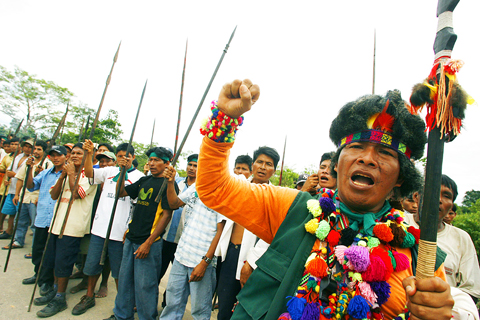Peruvian President Alan Garcia labored on Saturday to contain Peru’s worst political violence in years as nine more police officers were killed in a bloody standoff with Amazon Indians fighting his efforts to exploit oil, gas and other resources on their native lands.
The new deaths brought to 22 the number of police killed — seven with spears — since security forces moved early on Friday to break up a roadblock manned by 5,000 protesters.
Protest leaders said at least 30 Indians, including three children, died in the clashes. Authorities said they could confirm only nine civilian deaths, but cabinet chief Yehude Simon told reporters that 155 people had been injured, about a third of them with bullet wounds.

PHOTO: REUTERS
He announced a 3pm to 6am curfew, which took effect immediately in this sweltering jungle region where Simon said authorities had made 72 arrests.
In a statement on Saturday, Garcia defended the crackdown as an attack on “subversive anti-democratic aggression” that had blocked the flow of oil and gas from the Amazon and prevented food, medicine and gasoline from getting in.
The political violence is the Andean country’s worst since the Shining Path insurgency was quelled more than a decade ago and bodes ill for Garcia’s ambitious plans to boost Peru’s oil, gas and mineral output and spur logging and biofuel development. Garcia compared the “savage and barbaric methods” used to kill police “who had surrendered and been disarmed” with those employed by the Shining Path.
The violence began before dawn Friday when security forces moved to break up a roadblock protesters mounted in early April. About 1,000 protesters seized police during the melee, taking more than three dozen hostage, officials said.
Twenty-five officers were rescued in Saturday’s storming of Station No. 6 at state-owned Petroperu in Imacita here in the jungle state of Amazonas, authorities said, with two officers missing.
Simon said the nine killed were taken more than a mile from the station and slain while an army general was negotiating protesters’ retreat from the facility.
Among at least 45 people being treated at the main hospital in the Amazonas town of Bagua was local Indian leader Santiago Manuin, who received eight bullet wounds on Friday, a nurse said.
Also on Saturday, a judge ordered the arrest of protest group leader Alberto Pizango on sedition charges for allegedly inciting the violence, said Javier Villa Stein, the president of the Peruvian supreme court.

Kehinde Sanni spends his days smoothing out dents and repainting scratched bumpers in a modest autobody shop in Lagos. He has never left Nigeria, yet he speaks glowingly of Burkina Faso military leader Ibrahim Traore. “Nigeria needs someone like Ibrahim Traore of Burkina Faso. He is doing well for his country,” Sanni said. His admiration is shaped by a steady stream of viral videos, memes and social media posts — many misleading or outright false — portraying Traore as a fearless reformer who defied Western powers and reclaimed his country’s dignity. The Burkinabe strongman swept into power following a coup in September 2022

‘FRAGMENTING’: British politics have for a long time been dominated by the Labor Party and the Tories, but polls suggest that Reform now poses a significant challenge Hard-right upstarts Reform UK snatched a parliamentary seat from British Prime Minister Keir Starmer’s Labor Party yesterday in local elections that dealt a blow to the UK’s two establishment parties. Reform, led by anti-immigrant firebrand Nigel Farage, won the by-election in Runcorn and Helsby in northwest England by just six votes, as it picked up gains in other localities, including one mayoralty. The group’s strong showing continues momentum it built up at last year’s general election and appears to confirm a trend that the UK is entering an era of multi-party politics. “For the movement, for the party it’s a very, very big

ENTERTAINMENT: Rio officials have a history of organizing massive concerts on Copacabana Beach, with Madonna’s show drawing about 1.6 million fans last year Lady Gaga on Saturday night gave a free concert in front of 2 million fans who poured onto Copacabana Beach in Rio de Janeiro for the biggest show of her career. “Tonight, we’re making history... Thank you for making history with me,” Lady Gaga told a screaming crowd. The Mother Monster, as she is known, started the show at about 10:10pm local time with her 2011 song Bloody Mary. Cries of joy rose from the tightly packed fans who sang and danced shoulder-to-shoulder on the vast stretch of sand. Concert organizers said 2.1 million people attended the show. Lady Gaga

SUPPORT: The Australian prime minister promised to back Kyiv against Russia’s invasion, saying: ‘That’s my government’s position. It was yesterday. It still is’ Left-leaning Australian Prime Minister Anthony Albanese yesterday basked in his landslide election win, promising a “disciplined, orderly” government to confront cost-of-living pain and tariff turmoil. People clapped as the 62-year-old and his fiancee, Jodie Haydon, who visited his old inner Sydney haunt, Cafe Italia, surrounded by a crowd of jostling photographers and journalists. Albanese’s Labor Party is on course to win at least 83 seats in the 150-member parliament, partial results showed. Opposition leader Peter Dutton’s conservative Liberal-National coalition had just 38 seats, and other parties 12. Another 17 seats were still in doubt. “We will be a disciplined, orderly